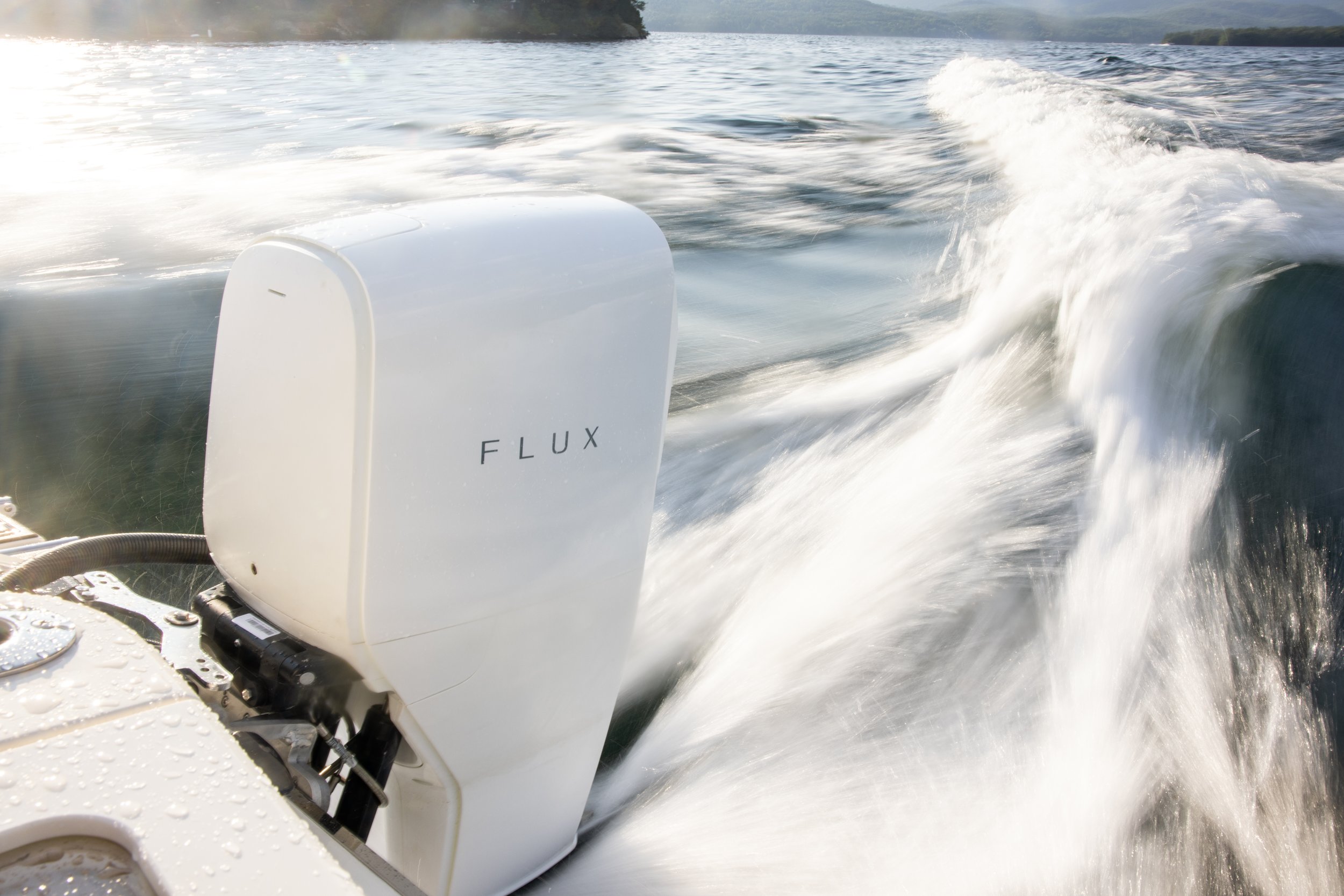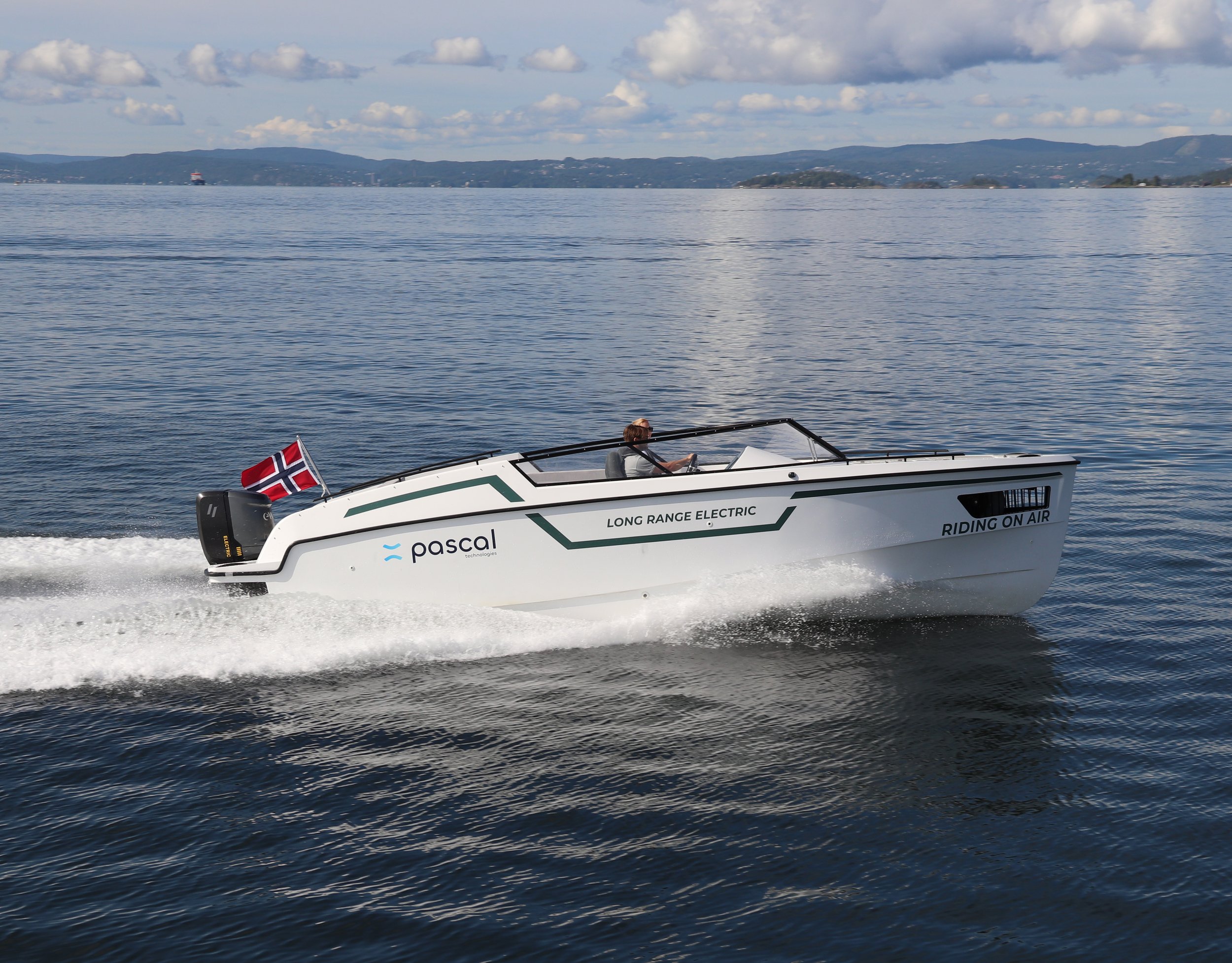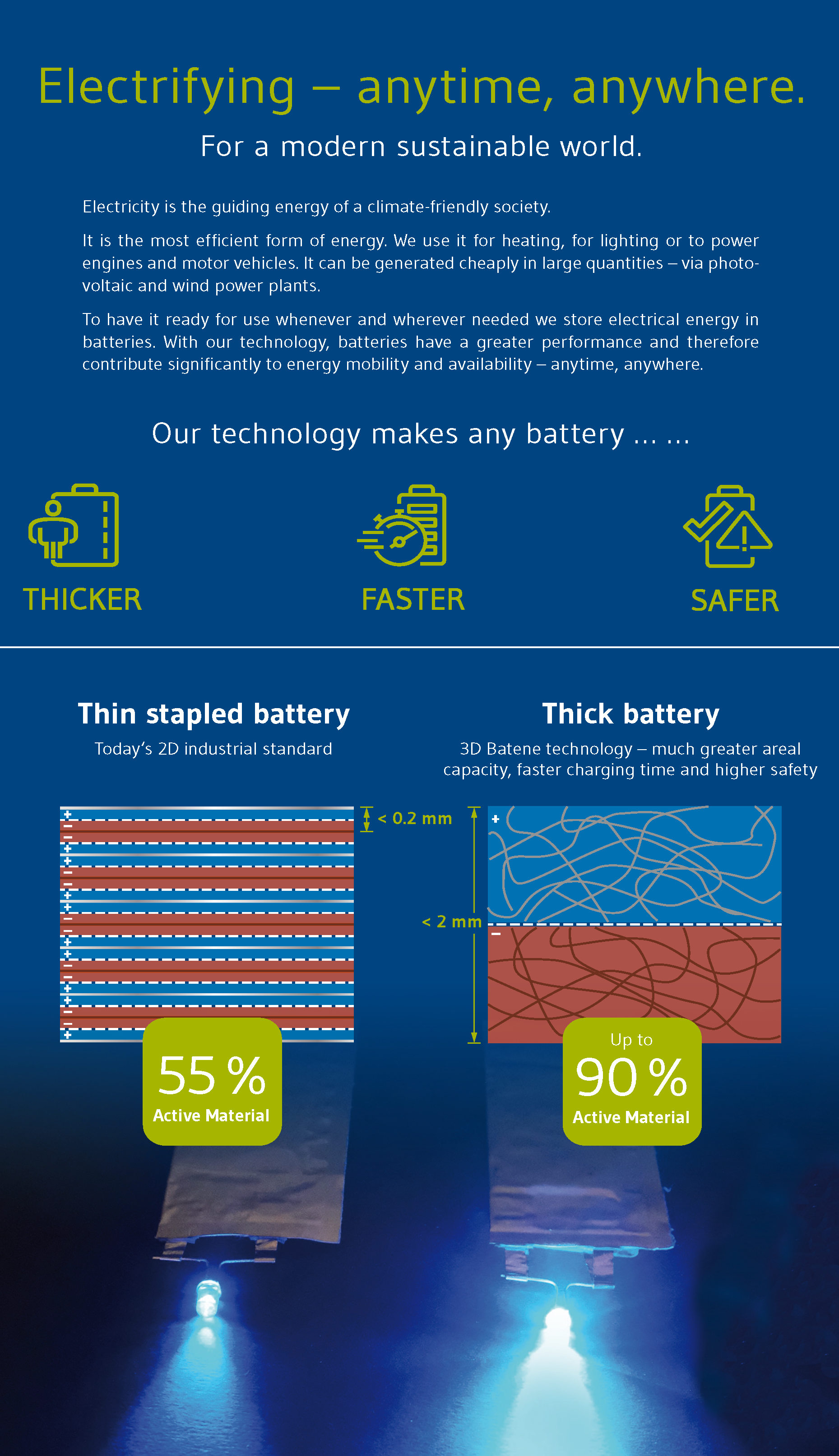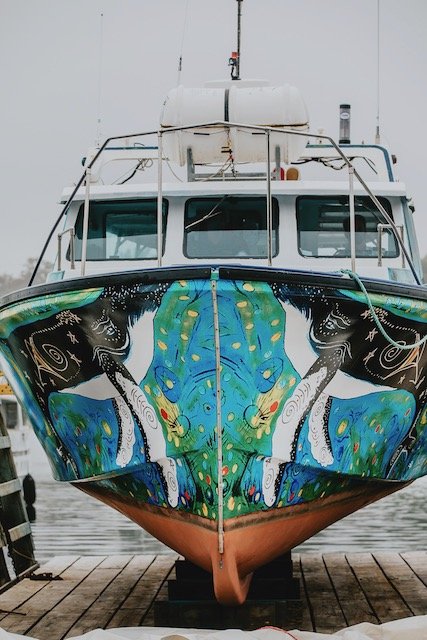We are the lead investor in eight promising companies that personify our approach:
Candela
A Swedish company headquartered in Stockholm that designs and builds all-electric boats that rise up out of the water on wing-like foils, reducing friction between the hull and water by 80%. The drop in friction allows significant range and makes all-electric battery-powered boating realistic. Only small underwater wings are needed to lift the hull out of the water because water is 800x denser than air. Thus a Boeing 747 fuselage riding on a wing underwater would need a foil 800x smaller than the wing it needs to fly in air. The initial Candela products, the C7 and C8, are recreational speedboats, but they are paving the way for acceptance of foiling electric-powered boats of larger sizes, and the company is focused on moving into the passenger ferry market, which would have a dramatic effect on CO2 emissions. Ocean Zero was the lead investor in a Series A round.
Oceanwings
A French company headed by noted naval architect Marc van Peteghem, who invented a set of sails shaped like airplane wings that won the 2010 America’s cup for Larry Ellison. From Wikipedia: “The rigid wing sail of USA 17 provided a decisive advantage and Golden Gate Yacht Club won the 2010 America’s Cup by a considerable margin.” AYRO has expanded the concept of wing sails to accommodate large cargo ships and created the Oceanwings®. It is building four huge Oceanwings® for the new ship Canopee, which will deliver rockets built in Europe to their launch site in French Guiana in South America. AYRO intends to retrofit such wingsails to hundreds of large commercial cargo ships and estimates wingsails can reduce fuel consumption by up to 50%.
Flux Marine
“Headquartered in Bristol, RI, Flux Marine is advancing electric marine propulsion technology to deliver the world's best boating experiences. The company builds electric outboard motors from the ground up leaving legacy combustion engine parts behind.
Flux Marine uses a lithium-based battery chemistry, featuring a modular battery approach that is designed in house. Flux’s outboard propulsion systems are actively cooled; however, they are designed such that the cooling system is completely closed loop and no seawater is ingested. The energy storage systems are passively cooled. Flux Marine utilizes cells that are ideal for the high continuous power demands of the marine environment, so they generate very low amounts of heat and operate very efficiently even in the most demanding conditions.
The outboard features a custom lower unit that is designed for low drag and clean propeller flow. For the best all-around performance, propellers are matched to the Flux propulsion system for better hydrodynamics.
Flux has curated boat packages available in RIB, dual console, and center console models. The outboards, boat packages, and battery packs from Flux deliver power and reliability while eliminating CO2 emissions and pollution that plague gasoline and diesel-powered boats. Ocean Zero was the lead investor in a Series A round.”
Pascal Technologies
This Norwegian company has invested more than 20 years developing air-lubrication as a means of reducing the friction between a boat and water. Overcoming friction is the key factor in creating an electric powerboat with significant range. Pascal has designed an automated system with a single high-volume, low-pressure pump in the bow that delivers air through a single slit in the hull, allowing a boat to float on a cushion of air at planing speeds while reducing friction by 50%. Pascal’s all-electric design has been proven in multiple sizes of boats from 8 meters to 20 meters, delivering range in an 8-to-10-meter recreational or work boat of more than 45 nautical miles between planing speeds. Although its prototypes are sleek and comfortable, without fumes, noise or maintenance issues, the company does not intend to build boats, but to work with boat builders to design an appropriate hull and install its computerized control system, air pump, and stern flap that adjusts the volume of escaping air from under the hull. The system is simple and remarkably robust. The design is ideal for both all-electric work boats and pleasure craft. Although Pascal is focused on smaller craft to grow the company quickly, its technology is scalable to ocean-going cargo vessels and could significantly reduce their CO2 emissions.
BATENE
This startup emerging from the Max Planck Society in Germany has invented a technology and unique fabrication process that allows lithium ion batteries to store much greater energy and discharge it at rates far beyond current standards. The technology also dramatically shortens recharging times. Batteries are essential to Ocean Zero’s focus because better batteries will enable greater range and power for ocean shipping and could leap the divide from fossil-fueled ships to all-electric ships, avoiding transitional fuels such LNG, emethanol and ammonia. With current battery technology, an all-electric sea-going commercial cargo ship is unrealistic because the energy density of diesel fuel is 16x as great as the best battery. BATENE’s inventions will increase range and safety as well as reduce battery fabrication costs for all types of transportation. The company is the brainchild of Dr. Joachim Spatz, a Director of the Max Planck Institute for Medical Research and a scientific member of the Max Planck Society. He has been developing this technology at Max Planck for eight years. The Max Planck Society will lease the IP to BATENE exclusively. Ocean Zero is a co-lead investor in a Seed round.
Hyke Smart City Ferries
There are tens of thousands of rivers, bays and harbors in the world where a high-volume, short-run, all-electric passenger ferry service would make life better. Commuter times could be cut by more than 50%, auto traffic congestion would dissipate, and urban transit users would enjoy their passages instead of resenting them. The first Hyke electric ferry was launched two months ago and if you visit the Paris Olympics next summer, you can ride on at least four of them across the Seine. Hyke ferries are inexpensive (a tiny fraction the cost of building a bridge or setting up a diesel ferry service), quiet, environmentally friendly, emit no CO2, can accommodate as many as 50 passengers, dock themselves, offer an innovative fully automated self-charging platform at each destination, have no fossil fuel aboard, and are engineered to become fully autonomous. Designed by Eker Group, Norway’s world-famous industrial design firm, they are simply beautiful to look at and a joy to experience. Ocean Zero has participated in two funding rounds of Hyke and is the second largest shareholder in the company.
Glas Ocean Electric
This company’s remarkable electric hybrid drive system for diesel fishing trawlers, commercial cargo ships and yachts can reduce CO2 emissions by up to 70%, eliminate almost all noise, eradicate fumes, and save owners more than half their operating costs. The electric drive is as drop-in unit brilliantly engineered in cooperation with British Aerospace Engineering and easily installed between a diesel power plant and a ship’s propeller, allowing efficient use of the diesel to get offshore, and then offering day after day use on electric power alone. The system collects data to provide operators with route and propulsion suggestions based on each vessel’s specifications and history at sea both in real time and after periodic analysis. By collecting wave, current, and weather data as well as performance variables under electric motor power vs. diesel, a ship’s efficiency can be finely honed. When in port, multiple Glas Ocean batteries on ships are easily connected together to store wind and solar output for extended baseload electricity use, especially in smaller towns that might not otherwise be able to afford such infrastructure
ZEN Yachts
A Zero Emission Yacht…Imagine a motor yacht that can operate 24 hours a day, 7 days a week and 365 days a year without a drop of fossil fuel aboard, without hydrogen or fuel cells or ammonia, without any kind of generator, without ever plugging into a charger, without any operational carbon footprint at all. That’s not a dream, it’s a reality, masterminded and designed by naval architect and CEO Julien Melot. The ZEN series of yachts, starting with the ZEN 50, will be built in Spain, and additionally powered, should you prefer even greater speeds and miles under your keel, with an AYRO wingsail that has no sheets or halyards, no worries, just a green button to engage its computer and a red button to disengage. The Wingsail even self-windvanes in high winds or furls itself. Imagine the impossible from that Windsail. Imagine that it can still power the yacht when sailing closer to the wind than you ever dreamed of—within 10 degrees of the apparent wind. Imagine a yacht that can sail within 340 degrees of a 360 degree circle no matter where the wind is coming from. Or not—just motor on indefinitely despite dark cloudy days, interminable nights, and whatever Mother Nature shows you—on solar power alone. Impressive? We think so. Ocean Zero took the entire Series A round. The first ZEN 50 is now under construction and will be launched next summer.












